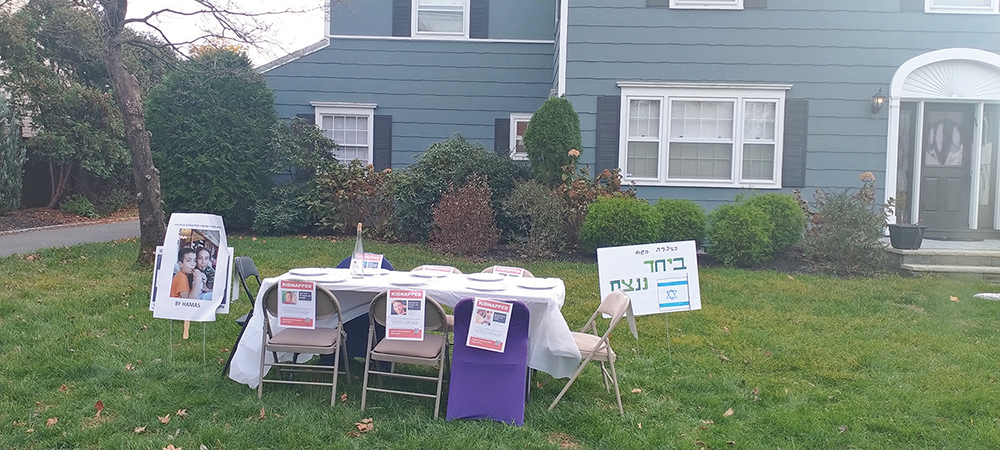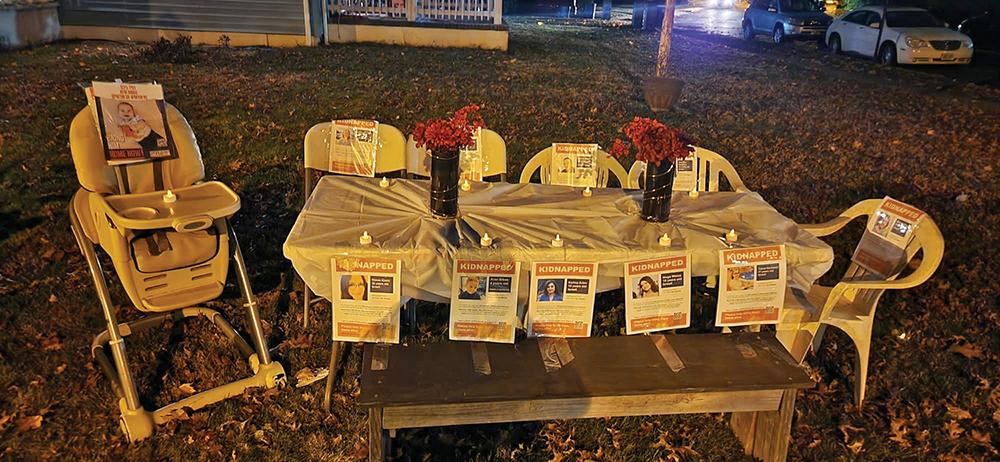
There’s a grief that can’t be spoken,
There’s a pain goes on and on
Here they sang about tomorrow
And tomorrow never came
Phantom faces at the window
Phantom shadows on the floor
Empty chairs at empty tables
Where my friends will meet no more
Les Misérables
How can we magnify the plight of our 240 brothers and sisters and their respective families, held hostage by Hamas terrorists in Gaza? Yosef Citron of Hillside, New Jersey, had an idea to magnify the void, which he hoped would inspire others: Empty chairs at empty tables.
“Within certain communities, long tables are displayed in one centralized location. My idea was to encourage families to set up a table (or two) in front of each home, thereby enhancing the personal void, awakening public consciousness, and inviting discussion that will hopefully result in the release of all hostages,” said Citron.
The visual effect of 10-month-old Kfir Bibas pictured in a high chair is one of many powerful examples. Many families plan to maintain these tables until all the hostages return home. October 7 was the largest massacre of Jewish people since the Holocaust. However, unlike the Holocaust, where it took decades for researchers to fully uncover Nazi atrocities, Hamas terrorists filmed the massacres, proudly calling their Gaza relatives to “celebrate” mass murder and evil atrocities.

In this week’s parsha, it states “Im Lavan Garti” (Gen. 32:5). Rashi famously explains that Garti is composed of the same letters as “Taryag,” indicating Yaakov’s ability, despite the stress, to observe all 613 commandments within the house of Laban. Rav Moshe Tendler added the Medrash Pelia, “Ufarah Adumah Hikravti,” intimating that similar to the statute of the red heifer, so too was Yaakov’s cognitive dissonance of free will and unequivocal determination to remain steadfast to Torah. The Levush explains Yaakov desired peace, just as we do today, but made it clear that if it was war Esau sought, then it is war that he would receive.
Pro-Hamas representatives cannot easily condemn the massacre of Oct. 7, diverting the narrative to “75 years of Israeli occupation.” What is shocking about this line of reasoning is that it demonstrates, as Prime Minister Benjamin Netanyahu explained to Dr. Jordan Peterson, a form of historical “ignorance.” Contrary to social media, the history of the Jewish people and our ancestral connection to Zion, Jerusalem and the land of Israel, date back thousands of years to the birth of Abraham in 1948 BCE.
Our history is rich and deeply connected with the soil of the land of Israel. Specifically, the Bible records that our history dates back to Abraham’s purchase of the Me’arat Hamachpelah (Gen: 23:16), to bury his wife Sarah, which is in modern day Hebron. There are numerous Biblical references to Jerusalem and our proud Jewish lineage exemplified by the monarchies of King Saul (II Samuel, 1:1); King David (1 Kings, 2:11); King Solomon (1 Kings, II:42); construction of our First and Second Temples; prophets; and Sanhedrin that organized our daily prayers where we yearn, especially during our long period of exile, to return to the ancestral land of our patriarchs Abraham, Isaac and Jacob, and matriarchs: Sarah, Rebecca, Rachel and Leah. Indeed, our indelible Jewish connection to Israel dates back thousands of years to 1948 BCE, not 1948 A.D., as certain cynical 60-second media clips suggest.

“They [call] on chariots, they [call] on horses, but we call on the name of God” (Psalms, 20:8). We are Am Livadad Yishkon. But are we ever alone? Never! Why? Imo Anochi b’Tzarah! When God initially appeared to Moshe in a burning bush, one that would not be consumed (Exodus 3:2), He did so to demonstrate, as Rashi explains, “I am with them during their time of trouble,” which is our root source of resilience, perseverance and strength. Amid the physical and psychological horror of Yadayim Yidai Esav, we resolved with determination to turn to God and use our most powerful weapon, Hakol Kol Ya’akov, beseeching and pleading for divine intercedence while drawing strength from the cohesiveness of Am Yisrael, as recently evidenced at the 300,000 strong DC rally on Nov. 14.
Our pride and resiliency are the envy of nations. We will continue our unique and diverse efforts until all hostages are returned home, since captivity is worse than starvation and death (BT Bava Batra 8b), and that any delay in freeing captives is tantamount to murder (Yoreh De’ah 252:3). Note the following verses tied to captivity: “Do not harden your heart or shut your hand against your needy fellow” (Deut. 15:7); “Do not stand idly by while your neighbor’s blood is shed” (Lev. 19:16); “You must surely open your hand” (Deut. 15:8); “Love your neighbor as yourself” (Lev. 19:18); and “Rescue those drawn to death” (Proverbs, 24:11).
May all the hostages return home such that our tables be filled once again with cheer and laughter, our wounds healed, and our nation forever united. #BringThemHome#
Am Yisrael Chai, V’Kayam!

Mordechai Plotsker runs a popular 10-minute nightly shiur on the parsha with a keen interest on the invigorating teachings of the Berditchever Rav, the Kedushas Levi. Plotsker resides in Elizabeth with his wife and children, and can be reached by email at marc.plotsker@gmail.com.









